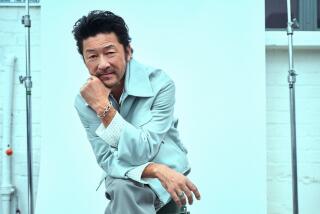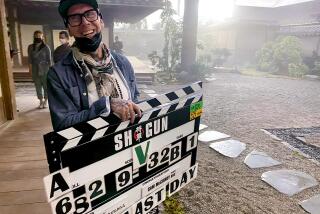FILM : Akira Kurosawa Goes Thataway in ‘Yojimbo’
- Share via
Akira Kurosawa must have been in a spry mood when making “Yojimbo.” His 1961 samurai movie (in Japan, it’s called a chambara ) both celebrates and teases the American Westerns he admired.
It’s Kurosawa’s respect for the genre that allows the humor to be so sly. This great director takes the conventions of the Western (especially those so closely linked to the chambara ) and toys with them, all the while keeping the action taut and the requisite violence free-flowing.
His dubious hero, Sanjuro (played by Toshiro Mifune) could be Clint Eastwood, strolling defiantly down a dusty main street, a long sword in place of a six-shooter. Actually, it’s Eastwood who could be Mifune--Sergio Leone’s spaghetti Western “A Fistful of Dollars” was modeled after “Yojimbo,” and Eastwood’s character was clearly based on Sanjuro and Mifune’s gloweringly comic performance.
“Yojimbo,” which screens at UC Irvine Friday as part of the UCI Film Society’s “offbeat” series, is said to have been Kurosawa’s most popular export in the early stages of his career. The reasons are pretty obvious: its reflection of the Westerns makes it more accessible to an American audience than some of his other movies and, although his characters have complicated moral shadings typical of Kurosawa films, “Yojimbo” can be enjoyed on a surface level. The simple plot moves and carries you along.
Sanjuro is a wandering samurai chance brings to a miserable little village in the midst of a gang war between a silk merchant (Kamatari Fujiwara) and a sake merchant (Takashi Shimura).
Sanjuro sees an opportunity to make some money so he displays his prowess, quickly killing three gangsters (he walks past the undertaker, saying nonchalantly, “Two coffins. . . . No, maybe three.”). When the bosses start bidding for him, Sanjuro plays one against the other, controlling the situation for the fun of it.
Later, he decides to do away with both of them, becoming the lone moral fixture in town. It’s interesting to note that Kurosawa scholars have argued about that point, many believing that Sanjuro is as cynical and amoral as everybody else in “Yojimbo.” If that’s so, then how to explain his dangerous befriending of a family caught in the middle? It’s true that it escalates the conflict and allows Sanjuro to raise the stakes, but the act seems more generous than that.
There have also been mixed views about the film’s violence. Kurosawa does appear to relish it, but the joking strokes he uses also defuse the bloodiness. One of the opening scenes, when a dog canters down the street with a human hand in his mouth, is more funny than lurid; the comedy demeans the violence.
Sanjuro’s casualness does the same. Mifune, Kurosawa’s favored actor, is responsible for making Sanjuro so amusing, but also so dynamic. It’s primarily an opaque performance that avoids any internalizing or actorly conceits. What he gives is an archetype of the superpowered loner, a venerable movie figure that always satisfies.
What: Akira Kurosawa’s “Yojimbo.”
When: Friday, April 12, at 7 and 9 p.m.
Where: UC Irvine’s Student Center Crystal Cove Auditorium.
Whereabouts: Take the San Diego (405) Freeway to Jamboree Road and head south. Go east on Campus Drive to Bridge Road. Take Bridge Road into the campus.
Wherewithal: $4.
Where to Call: (714) 856-6379.
More to Read
Only good movies
Get the Indie Focus newsletter, Mark Olsen's weekly guide to the world of cinema.
You may occasionally receive promotional content from the Los Angeles Times.










